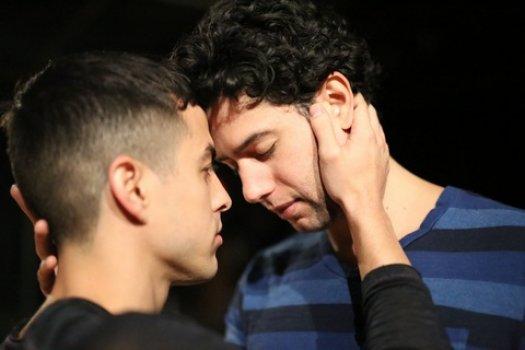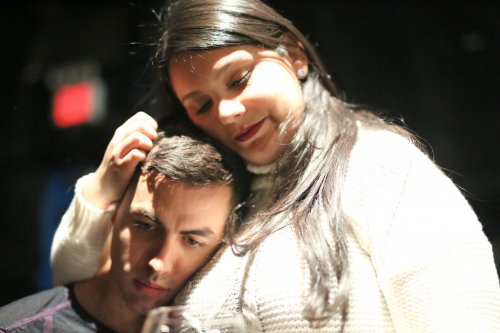I Catch You Dreaming
A young gay male and his female best friend arrive in NYC from Puerto Rico to make it as actors in this passionate and edgy update on the old tale.

Rafael Albarrán and Velson D’Souza in a scene from “I Catch You Dreaming” (Photo credit: Disanto Diaz)
[avatar user=”Darryl Reilly” size=”96″ align=”left” ] Darryl Reilly, Critic[/avatar] “We’re supposed to be Will and Grace,” says the full-figured Amanda to her best friend Dennis, a loquacious gay male, in Rafael Albarrán’s passionate and frenetic play, I Catch You Dreaming.
Both are in their early 20’s and have known each other for years in their native Puerto Rico, where they studied drama. After much conflict, they have left behind their romantic partners to pursue their dreams of being actors in contemporary New York City.
During the first act set in Puerto Rico, we meet Angel, Dennis’ handsome young boyfriend. The son of a minister, he had been previously sexually sheltered. Marco is Amanda’s cynical, but loving boyfriend, who wrote her a song, “I Catch You Dreaming.”
There are a few sexually suggestive scenes with slight nudity enacted by the two couples that are stylized, as opposed to being gratuitously explicit.
After a picaresque search for an affordable place to stay, they become roommates with the hard-edged but alluring, slightly older Maria, a Mexican immigrant, who exclaims, “I don’t trust Puerto Ricans.”
The harrowing travails of the two in New York (of course, Kander and Ebb’s “New York, New York” is ironically heard) and the devastating aftermath suffered by the lovers they have left behind are vividly depicted.
The age old saga of idealistic, small town strivers clashing with the harsh realities of the cold, cruel, big city is given a vibrant and jolting treatment here, with shades of the classic film Midnight Cowboy hovering in the consciousness.
Mr. Albarrán’s has richly detailed all of his characters and his dialogue for them is poetic, earthy, and wonderfully expressive in the style of John Patrick Shanley.
“One, two, three, four, five six, seven. A week. Plus two. Fourteen. Two weeks, four weeks, a month already? Time is slipping through my fingers. I don’t see time as I used to. I’m counting the weeks by the number of times that I come. One, two, three, four, five, six, seven. I’M SO HAPPY.”
Dream sequences, fantasies, and confessional monologues add to the play’s eclectic form. There’s a rapid montage portion with racing NYC denizens including business workers, homeless people, drunks, and cutthroat landlords. The plot turns are often typical for this genre, but there are enough new ones that make it all seem fresh. Playwright Albarrán, who is in his 20’s, also plays the leading part.
“To give myself a first-rate opportunity for dramatic acting,” was Noel Coward’s explanation of his early play, The Vortex, which he wrote and performed the leading role of a drug-addicted wastrel at the age of 24, and which made him a sensation. Mr. Albarrán here has continued in the author as actor tradition with considerable results.

Rafael Albarrán and Amanda Rios Nieves in a scene from “I Catch You Dreaming” (Photo credit: Disanto Diaz)
With his glittering eyes, beaming smile, throaty sincere vocal delivery, wholesome presence and sensual physicality, Dennis is a well-suited and bold vehicle for his acting talents. Whether being lighthearted and comic, or emotionally raw and dramatic, he is always compelling.
Amanda Rios Nieves as Amanda is delightfully sunny and brings great depth to the part with her simplicity. She perfectly embodies the familiar figure of the determined young actress battling the odds with zest and emotion. Her own physique matches that of the character. There are several references to her appearance, “And fat girls are trendy now,” and she radiantly and confidently reacts to these observations.
First as a supremely professional waitress, then as a supercilious casting director, and later as the domineering Maria, Annabel LaLonde is at all times markedly versatile. Bringing precise focus to each role, she truly excels as the bewitching Maria.
Bespectacled John Paul Harkins as Marco offers an excellent portrait of a tempestuous, young, romantic cynic. Velson D’Souza charmingly embraces all the facets of Angel’s life’s journey. From initially sweetly reserved to wantonly promiscuous, he is always committed to the character’s vicissitudes. Both of them also effectively double in other parts throughout the play.
As a totemic, recurring homeless woman, Serena E. Miller hauntingly conveys the intended pathos of this prophetic figure with her intensely wistful performance. Ms. Miller also opens the show with her very fine cello playing during the moody introduction. This also includes Aaron Pfeiffer who engagingly vocalizes as a singing waiter to a song he wrote the lyrics for with composer Daniel Ajl Kitrosser. His lively and suggestive music is well utilized throughout the show.
Gama Valle’s accomplished direction matches and enhances the heightened tone of the writing. With fast pacing, choreographic blocking, striking tableaus, and staged with the audience on all four sides, some sitting at cabaret tables, it’s a highly energetic and aesthetically realized presentation.
Two slightly raised platforms are wheeled out and connected to shift the action to New York City that is symbolically represented as a giant chessboard that the characters hurriedly pace on and about. It’s a highlight of scenic designer Angelica Borrero-Fortier’s evocatively simple settings.
The proficient lighting design of Jason Fok and that of sound design of Disanto Diaz captures the variety of places, time periods, and tones that the play encompasses.
Heartfelt, and heartbreaking, I Catch You Dreaming, is a beautifully theatrical reinterpretation of the eternal theme of the loss of innocence.
“I can’t believe this. Here… What are you writing on the cork?”
“Today’s date. I want to remember this night. November 13, 2009.”
I Catch You Dreaming (through March 22, 2015)
Oomph Theater
Flamboyán Theater, at the Clemente Soto Vélez Cultural and Educational Center, 107 Suffolk Street, in Manhattan
For tickets, visit http://www.eventbrite.com
Running time: one hour and 50 minutes with no intermission




Leave a comment